Jeremy Corbyn’s budget performance was rather better than usual. His criticisms came with a greater analytical clarity, his performance seemed a bit more heartfelt, and he even made a joke about press releases some people actually laughed at.
In an added bonus, a Labour response to a statement by the Chancellor did not involve a work of Marxist political thought being flung across the dispatch boxes. But this modest improvement won’t help him one jot in ever becoming Prime Minister. This is because Corbyn lacks the credibility among the political groups he would need to woo to have any hope of forming a government.
Very crudely, a party’s leadership must draw support from four such groups to win an election.
It needs it grassroots party members to get the vote out, it needs the party’s elected representatives to be on message to develop attractive policy and fight its corner in Parliament and the press, and it needs the backing of key power brokers, be they unions, businesses or media giants, to act as force multipliers for a party’s political message.
It also faces the small matter of winning the support of the electorate itself.
As the columnists of the Corbynite left like to repeat, almost as a mantra, Corbyn has the democratic mandate to lead the Labour party. And it’s true, there is no doubting that. Labour members, old and new, voted for him in their droves, attracted to his “different kind of politics” and his “man of principle” image. Questions about why this happened when it did will employ political scientists for decades to come.
But by having his principles so set in stone Corbyn has failed to build credibility as a potential Prime Minister, despite his popularity in the grassroots party. This is because politics, is fundamentally a game of trade-offs. From local meetings of constituency parties to G20 summits, politicians negotiate. They try to get as close to their preferred outcomes as possible, but compromises are inevitable.
Corbyn’s on the other hand, has one of the most disloyal Labour voting records of any serving MP. His unwillingness to compromise his policy positions to achieve other party goals in the past means that when he says that he is considering changing his position as leader, it is difficult for those with whom he must negotiate to believe him.
Take the EU referendum for example. While Corbyn is staying quiet on Brexit, his few speeches on the issue have come across as far from enthusiastic, much to the consternation of his party. Many suspect he might prefer to join Kate Hoey in the small Labour Leave camp, and for most Labour MPs, that is just not good enough.
As the leader of the party of opposition, this is a big problem. This failure to be a credible negotiator fatally undermines his capacity to build the broad base of support needed to topple a sitting government. Because many Labour MPs feel he cannot be meaningfully negotiated with, they have turned to open insurrection. They don’t just fail to support him, or refuse to serve in his shadow cabinet, they actively brief against him.
And as The Telegraph reported earlier this month, just 6 of the top 30 Labour donors under Ed Miliband have given any money to Labour at all under Corbyn. Instead, this cash is being diverted towards the shadow shadow cabinet of Labour centrists to fund their policy research efforts. From the point of view of donors, this is not surprising. What is the point of funding someone who won’t even meet with you?
The media too, has been denied the functional working relationship of previous regimes. When Russia Today regular and fierce critic of the mainstream media Seumas Milne is the party’s strategy and communications director, it is not surprising that relations between Labour and the papers are chilly at best.
But above all, while the public tends to lack the policy insight of your average hack, they are keenly aware of whether a politician is a real contender for office.
Labour’s own analysis of its defeat in 2015 showed queasiness about the prospect of Prime Minister Ed, and a stitch up with the SNP, cost them the election. People felt that he would give in too easily, and would not stand up for the national interest, because he was too weak.
Now, if being perceived as a bit weak scuppered Ed Miliband’s chances of high office, it is not hard to predict how the public responded to Corbyn’s uneasiness about ordering police to shoot to kill in the event of a terror attack on a point of principle.
This unwillingness to be responsive to what the public want, especially in terms of guaranteeing their basic security, has turned the public off. They don’t listen to Corbyn’s speeches, and Labour criticisms of Tory policy often fail to grab public attention.
Indeed, this failure to hold the government to account has allowed the Conservative party to have a civil war over Europe without fear of losing power to keep the troops in line. It is no surprise Corbyn is far from popular. In YouGov’s latest polling his net positives are -39. Cameron, by way of comparison, sits at the heady heights of -6. The electorate simply doesn’t buy Corbynism. Bennite democratic socialism is a bit last century.
Corbyn may have the support of a committed group of grassroots activists, but without the support of a much broader base of supporters, he will struggle at the next election, if indeed he makes it that far.
Corbyn spoke well at the dispatch box last week. But without electoral and political credibility such a rabble rousing speech will rouse no rabbles. And it is no coincidence Major Jarvis has been quietly cleaning his rifle.
NB: listing 49 of your MPs as “core group negative” and 36 as “hostile” is not the way to build an election winning coalition.


